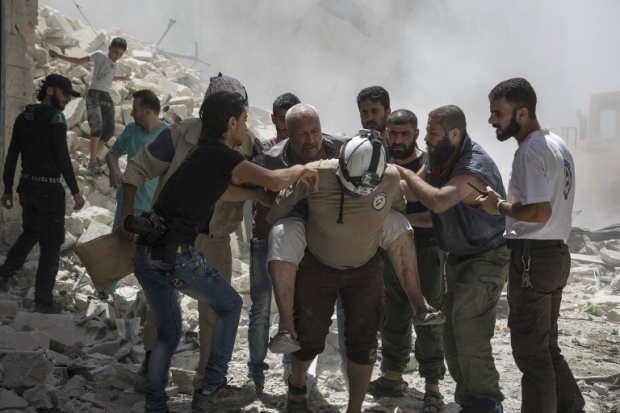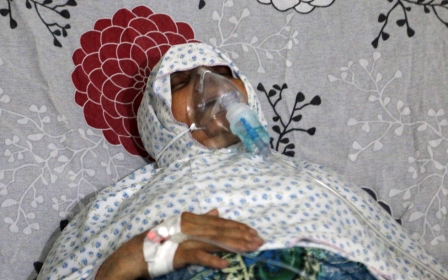Chasing bananas, dodging bombs: Life and death in besieged Aleppo

The Syrian army, supported by Shia militias and the Russian air force, was advancing quickly into Aleppo. While he filled his small backpack, Mahmoud laid out his plan.
“Within couple of days, they will take the last road connecting Aleppo city to its suburb, Castello,” he said. “I must leave now to make it in.”
In 2012, Mahmoud Rashwani, a 30-year-old activist, had left his home and family in Aleppo after he was arrested and tortured for participating in peaceful demonstrations.
On 12 July, he left another family – me and our six-month-old baby – to go back to what is left of Eastern Aleppo.
Vegetables and fruits were already running out in the city, so he carried some tomatoes to share with friends, and walked through the middle of the night with two doctors, who infiltrated through the government siege along with him.
I couldn’t help feeling abandoned. I was left with the great burden of taking care of a baby on my own. Still at least, I am not being left for another woman, but rather for a siege and a cause. He couldn’t leave his city when it needs him the most.
Adapting to hunger
“I saw a banana today! But I couldn’t catch it. It was running fast in the first-aid car that entered the city,” Mahmoud wrote on 10 August.
Among the estimated 300,000 to 400,000 people living on Aleppo’s eastside, Mahmoud hadn’t had any vegetables or fruit for the past month.
Aside from lack of fresh food, civilians in Aleppo were suffering shortages of fuel, canned food, eggs, sugar, flour and baby milk.
Bakeries have stopped selling bread. Instead, local councils are distributing it to achieve a balance so people will not hoard the precious commodity.
Among other tips have been recipes Aleppans could continue to cook, utilising traditional stocks kept in Syrian homes. The recipes mostly feature legumes – dishes like mujadara (a rice and lentil dish), lentil soup, lentils with rice and dried beans and tomato paste.
No fuel, no fire
But even cooking gas has become rare in the market and, when found, may not be affordable for the majority of civilians: Gas containers that used to cost 5,000 Syrian pounds ($10) are now 25,000 Syrian pounds. Other fuels have taken similar jumps.
A litre of petrol has risen from less than $1 to $6. The prices of basic food, including rice and sugar, have increased three-fold.
“The shelves of shops were all empty by the fourth week of the siege,” Salah, a media activist living in Aleppo, told me. “The big generators providing electricity to our houses stopped working because they couldn’t find fuel.”
“The hardest thing for me is being away from Omar. I miss him so much, but at least I can be sure he won’t be hungry or injured while I am standing helpless in front of him.”
The reasons Salah was drawn back into Aleppo were no different from those that took Mahmoud from us. “Being here will help the besieged civilians - either by documenting what’s happening to them with my camera or providing moral support to them,” he told me.
Big jail with no bars
Although the encircling of Aleppo could be seen coming for months, it still shocked people.
“We were surprised when it happened, in spite of speaking about it for so long,” said Samar, director of counselling and social support in the Space Of Hope organisation, a local development group working inside the city.
The shock forced Samar to focus first on imparting hope and strength to her team before they could begin to help the organisation’s beneficiaries.
“I told them we are not the only besieged town in Syria, we can learn from the expertise of others, we can calm the civilians down first then help them survive,” she said.
When the siege began, they ramped up a household farming project run by activists who volunteered to find and distribute seeds of basic vegetables to families so they could work towards food self-sufficiency.
Like other organisations in Aleppo, Space of Hope didn’t stop providing services and running child educational centres during the siege. “To give the people a sense that life hasn’t stopped, we are carrying on, and so are our projects,” Samar told me.
The main challenge the organisation has faced is the lack of fuel and the sudden halt of transportation. Even amid blazing heat and skies bristling with prowling jets, walking is the only available option.
Public coordination has shown its worst face over the past month. Some traders hid food to sell it later at even higher prices. But others kept prices the same, telling buyers, “We live and die together”.
Some activists turned their cars into free public taxis to help those struggling to move around the city.
The most dangerous city in the world
On a personal level, Samar was struggling with something else.
“I never knew what hunger meant before, and the city hasn’t been targeted as extensively as it is now. Still, that isn't the hardest thing on me,” she said.
“The toughest was dealing with the yearning to see my daughters, whom I sent to Turkey before the siege.”
Samar hasn’t seen her 19- and 12-year-old daughters for four months, and when she finally managed to get permission to cross the Turkish border to see them, the road to Aleppo was cut.
“I was so desperate and sad that I couldn’t hold my tears and stopped speaking to them, fearing that I might collapse,” she said.
Her shaky voice faded as we talked, then she continued: “When the rebels opened the road, I felt the ultimate happiness, more than when I held Momena (one of her daughters) in my arms for the first time. I really can't describe it to you.”
Madaya's destiny?
Amid the siege and before the rebel counter-offensive, public spirits hit a low. People resigned themselves to a destiny like that of Madaya, a city that has suffered for years from siege and hunger.
When the battle to break the siege began, all eyes were on the military situation.
“Whenever we go, people were asking us about battle updates, are the rebels still advancing? Where are they now? They wanted all the details,” said Mojahed Abo Ajoud, a media activist who works for the Aleppo Media Centre.
“But a couple days ago, all they were asking was, is there rice today? Will we get sugar? How much is the bulgur (cracked wheat)?”
As the siege was broken, Salah said, “the public mood lifted dramatically, people went down to the streets offering any kind of help, they all started burning tyres creating a black cloud to block the [Russian and Syrian] air force, applying a homemade no-fly-zone."
“This is how humanitarian the corridors suggested by the regime are,” Berbers Meshaal, a group leader of the While Helmets (civil defence force), told me.
Berbers lives with his wife in the city, and is awaiting the arrival of more supplies, while Salah, Samar and Mahmoud eye the road, a couple of metres of asphalt that separates them from their families, some for years in a recurrent scenario for Syrians as the UN stands by worrying, only worrying.
This article is available in French on Middle East Eye French edition.
Stay informed with MEE's newsletters
Sign up to get the latest alerts, insights and analysis, starting with Turkey Unpacked
Middle East Eye delivers independent and unrivalled coverage and analysis of the Middle East, North Africa and beyond. To learn more about republishing this content and the associated fees, please fill out this form. More about MEE can be found here.






